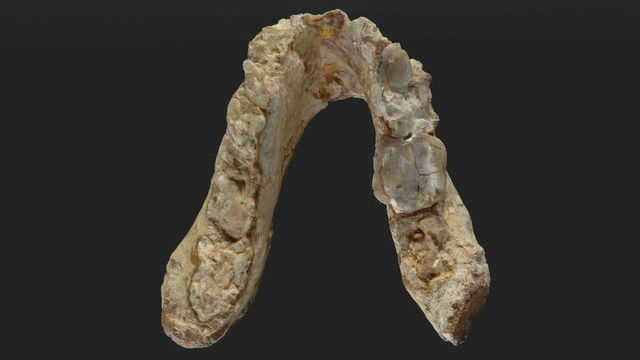New fossil 'rewrites history of human evolution'
Opinion is divided over whether discovery proves Europe was birthplace of mankind, not Africa

A free daily email with the biggest news stories of the day – and the best features from TheWeek.com
You are now subscribed
Your newsletter sign-up was successful
Scientists may have to rethink the theory that Africa was the geographical origin of our species after unearthing two fossils with ape-like teeth in Greece and Bulgaria.
Researchers uncovered an ancient species of ape called Graecopithecus freybergi or "El Graeco" which they believe to be the oldest known traces of hominins (or pre-humans).
Sarah Knapton, science editor at the Daily Telegraph, says the discovery "rewrites" the history of human evolution.
The Week
Escape your echo chamber. Get the facts behind the news, plus analysis from multiple perspectives.

Sign up for The Week's Free Newsletters
From our morning news briefing to a weekly Good News Newsletter, get the best of The Week delivered directly to your inbox.
From our morning news briefing to a weekly Good News Newsletter, get the best of The Week delivered directly to your inbox.
While experts believe our human lineage split from apes around seven million years ago in Africa, the new fossil discovery suggests Europe was in fact where mankind originated, she writes.
The two specimens are a fossilised lower jaw – previously found in Athens in 1944 – along with a tooth found in Bulgaria in 2009.
"No other fossil and living non-human primate is known with such [molar] roots," the researchers said in a statement, adding that they believed 'El Graeco' was "the oldest known potential pre-human".
"He is several hundred thousand years older than the oldest potential pre-human from Africa: 6–7-million-year-old Sahelanthropus from Chad."
A free daily email with the biggest news stories of the day – and the best features from TheWeek.com
David Begun, a professor of anthropology at the University of Toronto and a co-author on the study, published in the journal PLOS ONE, said: "This dating allows us to move the human-chimpanzee split into the Mediterranean area. People need to stop just thinking about Africa as the only possible location for this divergence. It could well have happened in Europe."
The new interpretation is important not simply because of "geographical bragging rights" explains the Globe and Mail, but because it could help "researchers arrive at a clearer picture of how and why hominins developed a unique set of adaptations, including smaller canine teeth and the ability to walk upright, that would later prove to be key evolutionary steps on the road to humanity."
Despite the findings, "there is no question that our species, Homo sapiens, originated in Africa between 100,000 and 200,000 years ago and subsequently spread around the globe," adds the paper.
Others are also sceptical about the claim that the research rewrites evolutionary history.
Kieran McNulty, an anthropologist at the University of Minnesota, says the work on the Greek fossil is "impressive" but it cannot definitively be shown to have originated from a hominin because "so little is known about the deep past of ape species that were not part of the human line".
"It's really difficult to interpret what those earliest common ancestors would have looked like, because all we can see is the end product of millions of years of evolutions in chimps and gorillas," he says.
McNulty added that the "weight of evidence" still favours a hominin origin in Africa.
Retired anthropologist and author Dr Peter Andrews agrees. He told the Daily Telegraph: "It is possible that the human lineage originated in Europe, but very substantial fossil evidence places the origin in Africa, including several partial skeletons and skulls."
"I would be hesitant about using a single character from an isolated fossil to set against the evidence from Africa."
-
 The ‘ravenous’ demand for Cornish minerals
The ‘ravenous’ demand for Cornish mineralsUnder the Radar Growing need for critical minerals to power tech has intensified ‘appetite’ for lithium, which could be a ‘huge boon’ for local economy
-
 Why are election experts taking Trump’s midterm threats seriously?
Why are election experts taking Trump’s midterm threats seriously?IN THE SPOTLIGHT As the president muses about polling place deployments and a centralized electoral system aimed at one-party control, lawmakers are taking this administration at its word
-
 ‘Restaurateurs have become millionaires’
‘Restaurateurs have become millionaires’Instant Opinion Opinion, comment and editorials of the day
-
 Epstein files topple law CEO, roil UK government
Epstein files topple law CEO, roil UK governmentSpeed Read Peter Mandelson, Britain’s former ambassador to the US, is caught up in the scandal
-
 Iran and US prepare to meet after skirmishes
Iran and US prepare to meet after skirmishesSpeed Read The incident comes amid heightened tensions in the Middle East
-
 Israel retrieves final hostage’s body from Gaza
Israel retrieves final hostage’s body from GazaSpeed Read The 24-year-old police officer was killed during the initial Hamas attack
-
 China’s Xi targets top general in growing purge
China’s Xi targets top general in growing purgeSpeed Read Zhang Youxia is being investigated over ‘grave violations’ of the law
-
 Panama and Canada are negotiating over a crucial copper mine
Panama and Canada are negotiating over a crucial copper mineIn the Spotlight Panama is set to make a final decision on the mine this summer
-
 Why Greenland’s natural resources are nearly impossible to mine
Why Greenland’s natural resources are nearly impossible to mineThe Explainer The country’s natural landscape makes the task extremely difficult
-
 Iran cuts internet as protests escalate
Iran cuts internet as protests escalateSpeed Reada Government buildings across the country have been set on fire
-
 US nabs ‘shadow’ tanker claimed by Russia
US nabs ‘shadow’ tanker claimed by RussiaSpeed Read The ship was one of two vessels seized by the US military